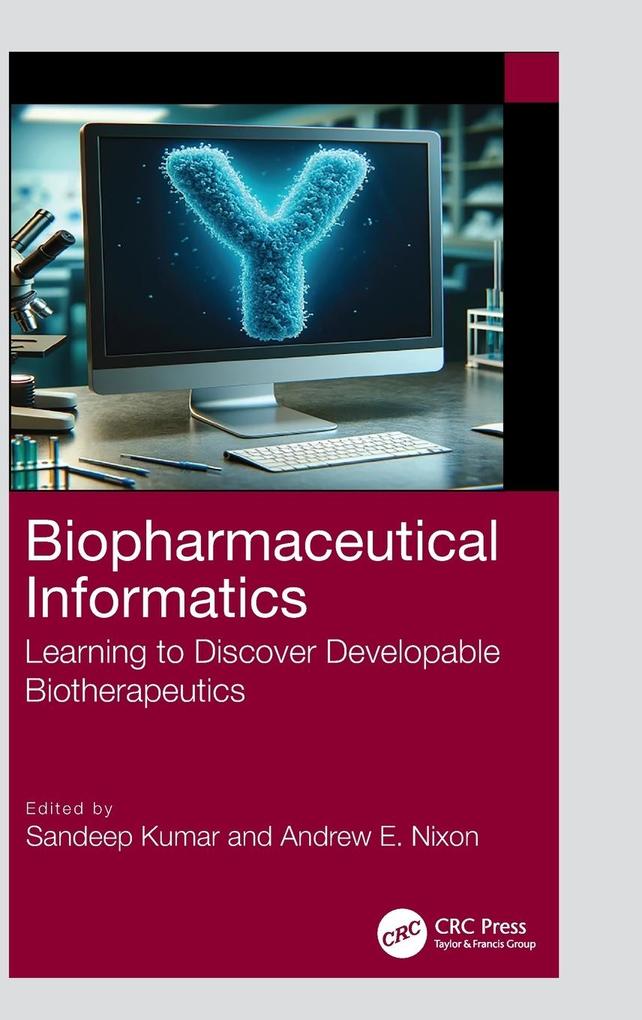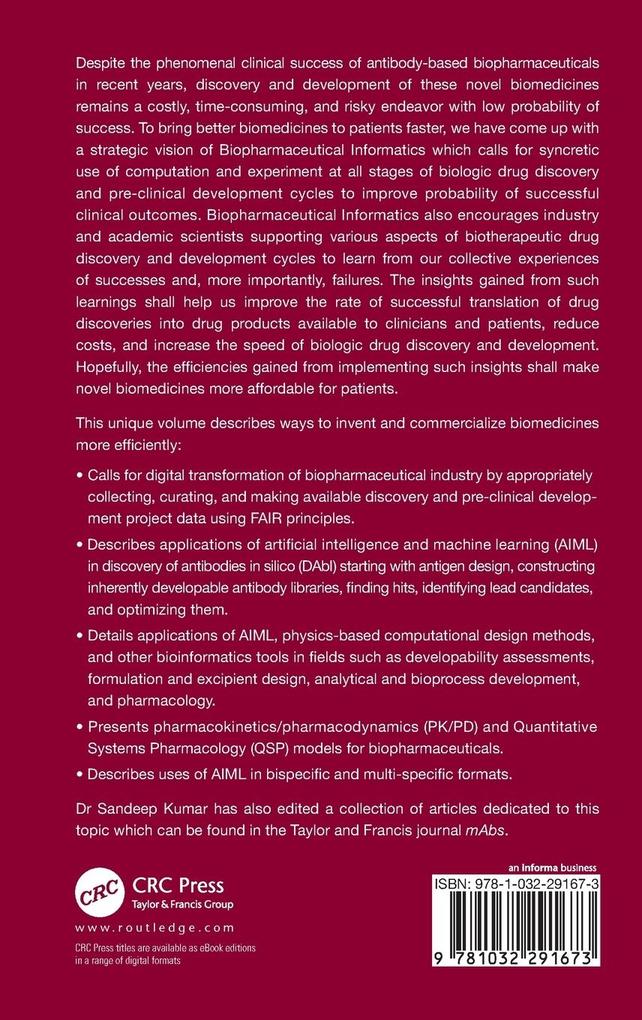
Zustellung: Di, 24.06. - Sa, 28.06.
Versand in 2 Wochen
VersandkostenfreiBestellen & in Filiale abholen:
This book describes ways to invent and commercialize biomedicines in a more time and cost-efficient manner. Failure to translate a discovery into a marketed drug denies us an opportunity to improve the lives of patients who do not have access to effective therapies. Here, the authors provide a greater understanding of biopharmaceutical informatics.
Inhaltsverzeichnis
Foreword
Preface
About the editors
List of contributors
1. Biopharmaceutical Informatics: An Introduction
2. Digital transformation in the biopharmaceutical industry: rebuilding the way we discover complex therapeutics
3. Computational protein design strategies for optimization of antigen generation to drive antibody discovery
4. Bioinformatic Analyses of Antibody Repertoires and Their Roles in Modern Antibody Drug Discovery
5. Applications of Artificial Intelligence and Machine Learning Towards Antibody Discovery and Development
6. From Deep Generative Models to Structure-Based Simulations: Computational Approaches for Antibody Design
7. Computational biophysical analyses of antibody structure-function relationships with emphasis on therapeutic antibody-based biologics
8. Use of molecular simulations to understand structural dynamics of antibodies
9. Considerations of developability during the early stages of antibody drug discovery and design
10. In Silico Approaches to Deliver Better Antibodies by Design - The Past, the Present and the Future
11. Use of systems biology approaches towards target discovery, validation, and drug development
12. Recent advances in PK/PD and Quantitative Systems Pharmacology (QSP) models for biopharmaceuticals
13. The Artificial Intelligence Revolution: Transforming the Design and Optimization of Multispecific Antibodies
Index.
Preface
About the editors
List of contributors
1. Biopharmaceutical Informatics: An Introduction
2. Digital transformation in the biopharmaceutical industry: rebuilding the way we discover complex therapeutics
3. Computational protein design strategies for optimization of antigen generation to drive antibody discovery
4. Bioinformatic Analyses of Antibody Repertoires and Their Roles in Modern Antibody Drug Discovery
5. Applications of Artificial Intelligence and Machine Learning Towards Antibody Discovery and Development
6. From Deep Generative Models to Structure-Based Simulations: Computational Approaches for Antibody Design
7. Computational biophysical analyses of antibody structure-function relationships with emphasis on therapeutic antibody-based biologics
8. Use of molecular simulations to understand structural dynamics of antibodies
9. Considerations of developability during the early stages of antibody drug discovery and design
10. In Silico Approaches to Deliver Better Antibodies by Design - The Past, the Present and the Future
11. Use of systems biology approaches towards target discovery, validation, and drug development
12. Recent advances in PK/PD and Quantitative Systems Pharmacology (QSP) models for biopharmaceuticals
13. The Artificial Intelligence Revolution: Transforming the Design and Optimization of Multispecific Antibodies
Index.
Produktdetails
Erscheinungsdatum
22. Januar 2025
Sprache
englisch
Seitenanzahl
368
Herausgegeben von
Andrew Nixon, Sandeep Kumar
Verlag/Hersteller
Produktart
gebunden
Gewicht
721 g
Größe (L/B/H)
234/156/22 mm
ISBN
9781032291673
Entdecken Sie mehr
Bewertungen
0 Bewertungen
Es wurden noch keine Bewertungen abgegeben. Schreiben Sie die erste Bewertung zu "Biopharmaceutical Informatics" und helfen Sie damit anderen bei der Kaufentscheidung.










